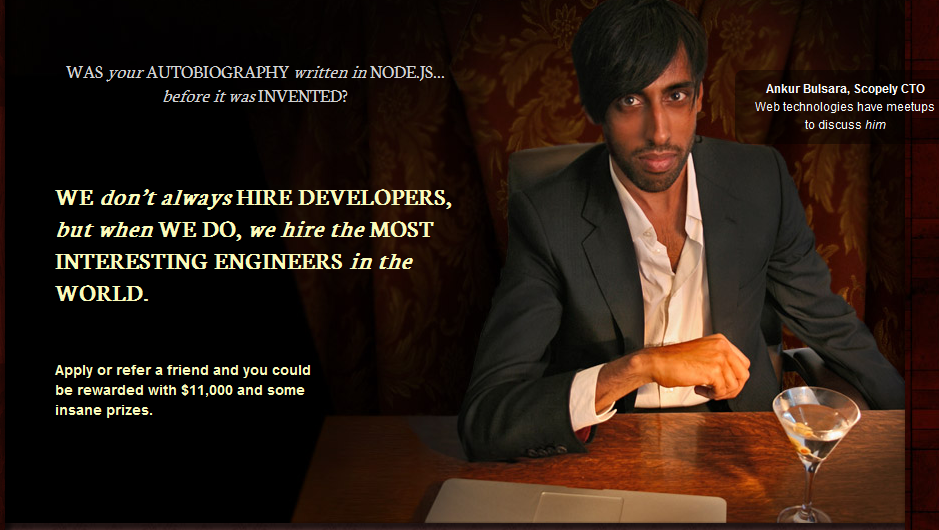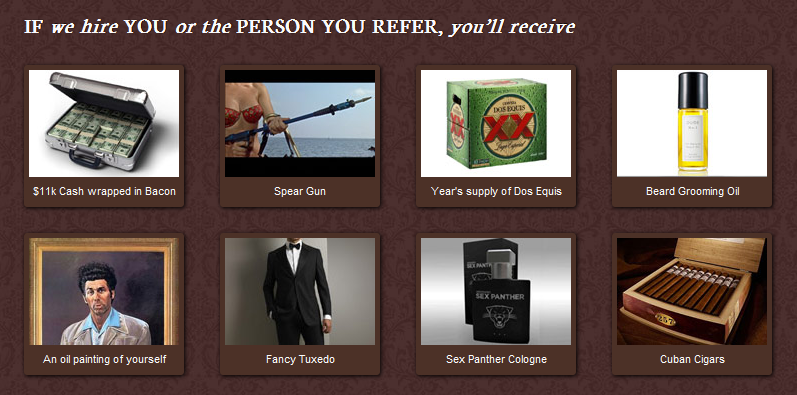The Most Interesting Corporate Career Site in the World?
It just might be this one, from stealth start-up Scopely. Scopely is clearly after talent that will match up well not only with the skills and experience that their opportunities require, but that will fit with its, let's say, out of the ordinary culture. When your CTO takes front and center on the company career site, complete with martini and a series of irreverent pitch lines like 'Did GOD use your wireframes to CREATE the HIMALAYAS?', candidates certainly get the impression that Scopely, at least taken at face value, is not looking for 'average' talent. Are you sure you want a job here?
Are you sure you want a job here?
And beyond the CTO as the Dos Equis man picture, and the pithy come on lines, Scopely sweetens the pot with an aggressive and creative sign-on/referral program. Newly hired engineers, (or their friends that make a successful referral), are eligible to receive a package that includes some of today's 'must-have' tech wizard items like a speargun, a 'fancy tuxedo', a year's supply of the aforementioned Dos Equis beer, and oh yeah - $11,000 in cash. Face it, no matter how cool your employee or alumni referral program is, unless you can find some 'sex panther cologne' or have some Cuban cigars laying around in the supply room, our clever friends at Scopely have you topped.
What does Scopely even do you might be wondering? Who knows, exactly? And the careers site, for all its fun and wackiness, doesn't make it easy at all to figure out. But perhaps that is part of the point. While the 'Dos Equis Man' takeoff, and the promise of beard oil and bacon wrapped cash, (did I forget to mention the $11K bonus comes wrapped in bacon?), are mostly designed to grab attention in a really competitive market for start-up software development talent, there is also just a hint of expectation that prospects, (or referrers), would have to do some digging to really learn about the organization and the potential opportunities. Sort of the same way most of us expect candidates for our organizations to do. Your referral bonus
Your referral bonus
And one more point about Scopely, their sort of insane careers page, and the most bizarre referral package I've seen in ages. No matter what you think of it all, and you're probably thinking it's either stupid, or just amusing, and NOT AT ALL what would be appropriate for your company, they have done all of us a favor of sorts. By setting a new kind of ceiling for recruiting fun and surprise, they in a way have given any of us a type of permission to get more creative and fun ourselves.
No matter how offbeat, unusual, unexpected, and crazy by your standards idea you have seems, the kind of idea that the suits and the bigwigs would NEVER approve, there is almost no chance it would top Scopely in those departments. So you have a kind of out, an excuse, a way to play the 'Look, I know this idea seems wild, but it really isn't all that crazy, just look at what these idiots at Scopely are doing. See, my plan is actually kind of conservative.'
Maybe the comparison won't get your idea approved after all. But even if it doesn't, you'll at least get to have a few laughs with the boss while you Google 'Sex Panther Cologne'.

 Steve
Steve



